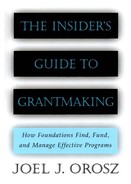Grantmaking: A Relational Enterprise
Grantmaking is inescapably a relational enterprise, which means that what passes between grantmaker and grantseeker is more than mere socializing; their relationship is the strategic bridge over which money, lessons learned, and ultimately social change must pass. It works only if it is a mutually respectful relationship of peers, not a patron-supplicant system. Given the inequalities of the power dynamic, however, this relationship of peers is easier to conceptualize than to accomplish.
The relational nature of grantmaking offers many opportunities for abuse. “It's not what you know, but who you know” goes the cynical old saw, and nowhere is it potentially more true than in foundations. It is unfortunately not unknown for a program officer to take this principle to the extreme by maintaining a largely closed circle of favorites and distributing largess to them on a regular schedule. The rationalization is that in making any grant, one is betting on the integrity of the grantee, so it is sensible to back people whom one knows to be honest and capable. There is some merit in this argument, but it does not begin to justify setting up a small and exclusive clique of recipients.
The degree of openness you can display will, of course, depend largely on where your foundation falls on the 4-P continuum. Grantmakers in passive foundations will be far more open than their counterparts in peremptory foundations. Grantmakers in proactive foundations should be quite open, for they will need new partners to add to their grant clusters, whereas program officers in prescriptive foundations will probably be much less so, because their agendas are largely set. No matter where your foundation falls on the continuum, however, it behooves you to retain at least a certain level of openness, for no institution has ever cornered the market on innovation or worthwhile ideas. To be completely closed is to turn off the agitator in the foundation washing machine: the rest of the apparatus may still work, but the outcomes will not be as satisfying.
Although openness is a virtue, it is not without its costs. The responsibilities on the shoulders of the typical grantmaker on any given day are daunting and time-consuming. The last thing an overloaded calendar needs is an unexpected meeting. Cold telephone calls are even worse, for they arrive without warning, interrupt workflow, and often come in unwanted clusters. It becomes very tempting to decline meeting requests and refuse to take phone calls, simply to keep control over one's day. Yet as time-consuming and unproductive as these can sometimes be, they are frequently a prime source for great new ideas. (There are many other sources, such as reading widely, working networks, surfing the Web, and the like, but these are more easily scheduled.)
The grantmaker who does not return calls or accept invitations to meet may gain in efficiency over the short term, but he or she loses touch with the flow of promising ideas, not to mention giving the foundation field a reputation for unresponsiveness. The temptation to do so, however, is great. When you are overbooked, many things are difficult to cut from the “to do” list, such as projects ordered by the boss, or standing internal meetings. You can cut meetings with applicants, however, with no immediate negative consequences. Such temptations must be strenuously resisted. It is obviously very important for you to manage your relations with applicants so as to maximize the value of the time for both you and them.
